Peter MALONE
Saturday, 18 September 2021 19:29
Christ Stopped at Eboli
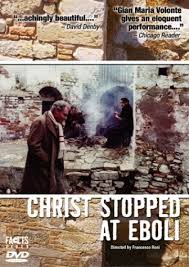
CHRIST STOPPED AT EBOLI
Italy, 1979, 161 minutes, Colour.
Gian Maria Volonte, Irene Papas, Paolo Buonacelli, Alain Cuny. Lea Massari.
Directed by Francesco Rosi.
Christ Stopped at Eboli is an Italian literary classic by Carlo Levi. Director Francesco Rosi has a reputation for making perceptive hard-hitting political films (Hands Over the City, Lucky Luciano, Context). He does this here, slowly, at great pains to set a desolate scene and to make impact by immersing his audience in a remote Southern village, its poverty and ignorance, superstition, lack of interest in government and the daily struggle to survive. Levi, the political internee from Turin, observes and gradually becomes involved. Gian Maria Volonte gives a sombre performance. The time is 1935, the atmosphere Fascist, the tension the war in Abyssinia. The film informs by feeling and questions the Italian way of life in the early 20th century.
1. The work of the director and his socialist background? His interpretation of Italy during the 20th. century? Abuses? The ignorance of the Italian public? Their manipulation? The value of this kind of film as a portrait, a memoir, an interpretation, a breaking through attitudes? The reputation of Carlo Levi's novel? Its classic status in Italy? The value of a cinema presentation of it? For Italians, for world-wide audiences?
2. The value of the location photography, its flavour and atmosphere? The focus on Southern Italy? The train ride into Lucania? Eboli station? The drive to Gagliano? The town itself, its antiquity, the hills, the fields? The many overhead shots to give an atmosphere of the landscape? The hardness of nature, the town, the people? A re-creation of 1935?
3. The importance of the people of Gagliano - outsiders' comments on them as being hard? The portrait of them - close-ups, groups, the details of their day-to-dag life? Their struggle with the land? Survival? Attitudes towards government? Sense of isolation? Their being pressurised to support the fascist state, the war in Ethiopia? The significance of the title - Christ and God not wanting to be with these people? The irony of the religious overtones of the title?
4. The significance of the initial paintings? The close-up of Carlo Levi himself? His memoirs? The 1935 way of life through his interpretation and memory? How authentic his memory? How real? The outsider looking at the society and interpreting it? His experiencing it as fellow Italian yet as strange?
5. The importance of the audience entering Gagliano with Levi? The train, Eboli, the 1935 car ride? The voice-over comments - did the audience agree with them at the end or not?
6. How well did the structure of the film work for audience involvement and the interpretation of the people? The atmosphere of the time, the passing of the twelve months of Levi’s internment, the cumulative effect of episodes. the highlighting of a group of characters, the interplay from one episode to another not stressed, the length of the film? The lack of a dynamic and dramatic momentum? The effectiveness of the cumulative experience of what Carlo Levi himself experienced?
7. The background of Italy in 1935 - prosperity in the north, Mussolini as a man from the north, the fascists and the imposition of rule? The mayor of the town and his fascist loyalty? His hangers-on and administrators? The police and their loyalty but their interest in the people of the town? The fascist rallies, the lack of support, the few men going off to the war? The radio broadcasts? The communists and their imprisonment - and their not being released at amnesties? Gagliano being used as a prison town for northerners? The build-up to World War Two? The motives of Mussolini, the need for land in Africa, the expansion of empire? The irrelevance of involvement in Ethiopia for the peasants of Gagliano? Their reaction to day by-day work, hard work? Legal impositions from Rome - and the destruction of their goats? The harshness of nature? The possibilities of migrating to America - and so many of them doing it, yet returning because of homesickness? The place of the church in this atmosphere - the stoning of the priest by the boys, the Christmas Mass and the accusations of his being drunk, his attack on the war in Ethiopia, the walkout of the mayor and his associates? The irrelevance of religion? The predominance of superstition?
8. The ironies of this enclosed and isolated world yet so many of the men having been to the United States of the '20s and '30s? Their talk about America? The irony of talk about skyscrapers and crowds in Gagliano? The comparisons of the barbers' shops in New York and Gagliano? The insight this gives into Italian migration?
9. The portrait of Carlo Levi? The film's lack of clarity about his political stances except that they were anti-fascist? A cultured and educated man from the north? His medical background? His being interned in isolation? His observation of the town, people, its way of life? The audience sharing his point of view, surprise and shock, sympathies? The initial interviews, the arrangements for accommodation? His beginning to talk with the local people - the old man with his musical instrument and playing? The attitudes of the police? The mayor and his self-importance yet deferential to the outsider? The encounter with the priest and his being stoned by the boys? The ironic interview with the Count - his religion, superstition, aristocracy? His staying the night in the house? His emphasis on relics? His emphases on making money? The importance of Levi's sister and her visit? Somebody from the outside world, appearing as normal to him, talking about causes, family, interests? The enjoyment of her visit, the loneliness of her departure? The encounters with the various men in the town - their talk about America, their work in the town? Julia and her son? Her work, the peasant woman and hard labour, her superstitious practices? Levi's wanting to paint her and her not wanting this? The discovery that he has a doctor and people pouring out their needs, asking for his medicines? His attempts to meet their needs? His visit to the sick man - and the pressures put on the mayor and the police to let him go? Their not wanting to take responsibility? The irony of the mayor's daughter being sick and Levi being able to get permissions for working in the town and the help from the pressure of the mayor's wife? The changing of the seasons, the observations of the kinds of work? The achievement of Levi by the end of his time in prison? The build-up of the amnesty? His being released? The homage that the people paid him on his departure? How persuasive was the film in presenting Levi as an important and admirable character?
10. The portrait of the mayor, his pomposity, his censoring of Levi's letters, his advice and diplomacy about the sending of letters? The importance of his accusations of drunkenness towards the priest at Midnight Mass, his walking out during the sermon? His anxiety about his daughter? His observation that he was authority and he was above the law? The place of the police in Gagliano - supervising the imprisonment, yet sympathetic especially in the needs for Lev! to visit the sick?
11. The sketch of the priest - old, isolated, embittered, being stoned, calling the people a profane common herd, his condition at Christmas, his celebration of the Mass, his sermon - and the trick of pretending that his sermon was not there and then finding it? His observations on the war, on Italy and its place in the world?
12. The Count and his highlighting religious attitudes in southern Italy - and superstition?
13. The counterbalance of the ideology of Levi's sister, political causes, social action?
14. The interest of the peasants and the people of the town - their talk, isolation, sitting around at meals, the meal with the men singing the songs and exchanging their memories?
15. The insight into the town through Julia and her son, the bath sequence, the superstitions, her refusal to be painted?
16. The sequences of the peasants in the fields, the storms and thunder and lightning superstition, the eclipse of the sun, the killing of the goats, the pig veterinarian and his brutality, the presence of the people at Mass, their sons going to the war or not?
17. The portrait of Italy in the 1930s? Ideology, survival? The attitudes of the south? The hostility towards Rome? Survivors? The blend of nostalgia about the past, critique, hopes for the future?
Published in Movie Reviews
Published in
Movie Reviews
Tagged under
Saturday, 18 September 2021 19:29
Christopher Columbus
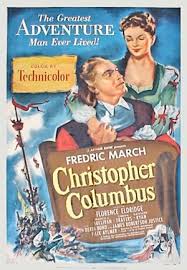
CHRISTOPHER COLUMBUS
UK, 1948, 104 minutes, Colour.
Fredric March, Florence Eldridge, Francis L. Sullivan.
Directed by David Mc Donald.
Christopher Columbus is a rather solemn British post-war biography of the famous explorer. Fredric March gives an earnest performance trying to communicate the intense vision of Columbus and his adventurous recklessness. Period re-creation is useful as well as the presentation of the geographical beliefs of the time. Useful history and biography.
1. Was this a successful historical epic? Why? Did it give good insight into history and the character of Columbus? How?
2. Comment on the documentary overtones of the film. The Commentary, picture of the Spanish court, details of Columbus' attempts to interest monarchs. details of his voyage? Was this a predominant note of the film?
3. How successful a character study of Columbus was the film? Did the film give enough of his background? of his attempts to interest the monarchs in his voyages? In his ambitions? In the achievement of his ambitions? In his seeming failure? (The omission of his death in poverty?)
4. What explained the drive in Columbus' vision and in his life? What grounds did he have for his belief in a New World? Why did they consume him so much? Which sequences best illustrated this?
5. How interesting a picture of the 15th century world did the film give? Life at the court, intrigue, the role of the church, the ambitions of nobles, the lot of the ordinary seaman, the ambitions of Spain etc.?
6. How successful was the film in communicating the frustrations for Columbus as he waited at court? The reasons for his having to wait? Wars vs exploration? The caprices of kings and queens etc.?
7. The importance of the relationship between Columbus and Fra Jose? The film opening with this? Our sympathising with Columbus through this? The pleas of Jose and the Chamberlain for Columbus' vision?
8. How well did the film communicate the personalities of the king and queen? The king as flirting with maids, taking advice from Bobadilla? The queen as more personal, her relationship with her husband, her capacity for ruling Spain, her interest in Columbus?
9. Was Bobadilla too obvious a villain? Why his scepticism? His rudeness to Columbus? His financial interest? His influence with his niece at court?
10. Were the romantic interludes helpful for the film? Columbus' attachment to the widow and her manoeuvring of him? Was this convincing? The wise advice of Beatrix at the Inn?
11. Was Diego's character well-defined? His wanting to be a notary? His interest in Columbus? The scene at the Tavern? His role in the voyages? His place in the New World?
12. How interesting were the voyages themselves? Columbus' drive and his tricks with the crew? What did this say about him?
13. The sailors themselves? The scepticism and the grizzling of the old man? The nature of the superstitions about the unknown world? The reality of the mutiny? Was it too providentially cut through? Did this give a genuine picture of the difficulties for Columbus? The uncertainty, the length of time, the wanting to find land?
14. How exhilarating was the discovery of the New World? What was your reaction to his taking the New World in the name of Spain? The colonial overtones of the film? Columbus and the Spaniards? convinced of their right? The natives? Their friendliness and trading? The duplicity of the Spaniards in tricking the natives? Bringing back natives to Spain? Columbus' triumph - was it well deserved?
15. How surprising was Columbus' failure as governor? How much was his fault? His lack of experience in this field? Were the king and queen right to relieve him of h-is duties? The irony and sadness of his being in chains? The comment on h-is success? was the queen right in her insight about his capacities?
16. How valuable are films like this in showing history and historical personalities?
Published in Movie Reviews
Published in
Movie Reviews
Tagged under
Saturday, 18 September 2021 19:29
Cyrano de Bergerac
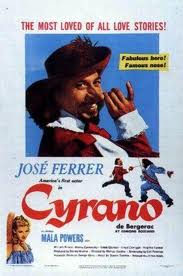
CYRANO DE BERGERAC
US, 1950, 112 minutes, Black and white.
Jose Ferrer, Mala Powers, William Prince, Morris Carnovsky, Ralph Clanton, Virginia Farmer, Elena Verdugo.
Directed by Michael Gordon.
Cyrano de Bergerac comes from the famous play by Edmond Rostand. Produced by Stanley Kramer in the period when he acted as producer for such films as The Men, Member of the Wedding, Death of a Salesman, the film was directed by Michael Gordon. The screenplay was by Carl Foreman, who worked on so many films like The Victors, The Guns of Navarone and Born Free. The musical score was by Dimitri Tiomkin who had many successful scores at this time including High Noon and The High and the Mighty. The film is artificially staged and very much studio-bound. However, it had great success insofar as Jose Ferrer won the Oscar for the Best Actor of 1950. Ferrer had moved from the stage to screen with such films as Joan of Arc. He was to become a very successful actor and director.
1. What was the main impact of this film? Interest, enjoyment, curiosity piece?
2. Comment on the film's style: was it too stagebound, or was it well adapted to the screen? The quality of the dialogue, its wordiness and wit? The impact of words? The 17th century atmosphere of sets and costume and manners? The French background and the way this was communicated?
3. Jose Ferrer won the Oscar for this performance? Did the performance merit this award? Why? What were its main characteristics? The reasons for its success? Did the performance match the film?
4. what was the purpose of making this film? Did the film present a real world, a representation of a historical period and characters? How artificial was the world presented? How important was this artificiality? What were the important themes presented in the film: self-image, self-worth, pride, fear, the discovery of being oneself etc.? Were these the main themes? What other themes were prominent? Were they well presented in this film?
5. What kind of a person was Cyrano? Did he seem real, credible? As a man, the explanation of his background, career, style? Cyrano as a figure? A symbol? A strong man and a weak man? The reasons for his strength and weakness, his attitudes towards himself, the truth, his feelings? The significance of his nose? The importance of his drawing attention to it, the long speech about the different approaches to his nose, the nose as symbolising his self-image and self-worth? Was this a successful device, his focus on the nose?
6. The impact of the theatre sequence at the beginning? Cyrano's presentation of himself, in society, his attitude towards the artificiality of the performer, the political overtones, his sword-play, giving his money away as a gesture for the moment even though it entailed poverty? The importance of the sequence of his fighting a hundred men? His sword skill, his self-assertion?
7. How did this contrast with the image of himself where Roxanne was concerned? Why did he lower his estimation of himself? Become insecure? The importance of the sequence where Roxanne asked for his help? His decision to remain in the background and not reveal his love?
8. The contrast of his meetings with Christian? The initial talks and his wanting to fight him, his submerging his own feelings for the sake of someone Roxanne loved?
9. How credible was his wooing of Roxanne for Christian? The contrast of the inarticulate handsome man with the articulate ugly man? The point being made by this? Roxanne’s love for the real man? The wooing by letter, teaching Christian to memorise lines, Roxanne's response? The importance of the balcony sequence where Cyrano's real sentiments take over, Roxanne's response to this, the irony of the truth?
10. The impact of the battle sequences? How real? How artificial? Cyrano's writing and delivering the letters? The importance for Roxane and Christian?
11. The dramatic impact of Roxanne’s being present at the battle, the effect on Cyrano, the truth for Christian?
12. How noble was the gesture of Christian going to die? Leaving the choice for Roxanne? Discovering the truth? Dying happy with the aid of Cyrano? The message in this gesture of Cyrano?
13. How well did the sequences of the aftermath of these events-fit in with the previous part of the film? Cyrano's satires, political stirring, assassination? The contrast then with visiting Roxanne every Saturday, her retirement into her memories?
14. How poignant was the scene of Cyrano’s death? The visit to Roxanne, chatting with the nuns, his recounting the gossip, the inevitability of his death, his reciting the final letter, the discovery of the truth? The sentiment expressed in this, how well incorporated into the feeling of the film? Audience response to this final revelation of the truth?
15. How valuable a film was this? Or, with its artificiality and remoteness, does it seem a curiosity piece?
Published in Movie Reviews
Published in
Movie Reviews
Tagged under
Saturday, 18 September 2021 19:29
Curtain Call at Cactus Creek
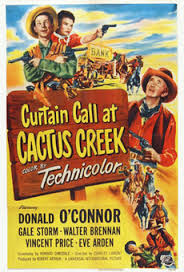
CURTAIN CALL AT CACTUS CREEK
US, 1949, 83 minutes, Colour.
Donald O'Connor, Gale Storm, Eve Arden, Vincent Price, Walter Brennan.
Directed by Charles Lamont.
Curtain Call at Cactus Creek is a very entertaining small film. It is in the vein of the western spoofs like Cat Ballou and, especially, Support Your Local Sheriff (with Walter Brennan again). It is an entertaining vehicle for Donald
O'Connor as a song-and-dance man and pleasant hero. He had just made Francis at the time and was about to move into bigger films as Singin' In The Rain and There's No Business like Show Business.
Gale Storm is the attractive heroine but the strength of the cast is in its support: Eve Arden doing her usual sardonic act and giving a rendition of 'Waiting at the Church'; Walter Brennan mimicking his western style and anticipating the roles that he had in the 60s - and even coming on as a black mammy in the minstrel show at the end; Vincent Price as a would-be Shakespearian ham - also anticipating his later roles, especially Theatre of Blood. The songs were entertaining, there were excellent excerpts of 19th century melodramas, even to hiss the villain. There are
entertaining bank robberies and the use of the conventions of the West. A very pleasant piece of Americana.
1. Entertaining comedy western? Its modest ambitions and its fulfilling them? Fun, satire, use of western conventions?
2. Production values and the use of the cast? The blending of the conventions of the western and the 19th century theatre? The melodramas and their style, soliloquies to the audience, hiss the villain, etc.? The Shakespearian quotations? The songs, dances? Robberies and chases and shoot ups? Dreams?
3. The western ingredients of the film: the initial robbery, an over-the-hill gang and their tough attitudes, pursuing marshals, chases and shoot-outs?
4. The picture of the theatrical troupe: Vincent Price's style as Tracy Holland: snob, mouthing Shakespeare, manipulating his troupe, meanness, ham acting, his performances, his response to Mr. Johnson and his gun? Refusing Eddie his opportunities and then letting him go on? Vincent Price's exaggerated by humorous style? The plays and their performance? Audience enjoyment of these 19th century plays? The irony of Tracy Holland helping at the end? Lily and her old glamour, Eve Arden and her sardonic style, the singing of 'Waiting at the Church', her performance in the Forlorn Mother, as Catherine the Great? Her concern about Julie, her answers to Tracy Holland? Walter Brennan as Mr. Johnson alias the bank robber and his helping Eddie with the work? Julie as the attractive and definite-minded heroine? Songs and dances? Ralph and his performances, driving the coach, his being tied up?
5. Donald O'Connor's bright personality as Eddie? The focus of the film? His selling ribbons and wanting to be an actor, seeming to be a failure? His hard work, putting up the notices, rushing during the performance? Dance while Tracy Holland was shaving? His going on and making a success of song and dance routines? The comedy with Catherine the Great? His mistake about the robbers? Employing Mr. Johnson and training him? His being imprisoned, the escape, his dream of being a bandit and being executed? His love for Julie? The final chase and his being set up to be the hero? The happy ending?
6. Walter Brennan and the satire on his western styles? The ageing bank robber? Pride in his work, challenging the marshal? His eye for Lily? His wanting Eddie to be a son - and outlaw? The humour with his helping with the troupe? His performance as the negro mammy at the end?
7. The western types: the pursuing marshal, the fat bank manager, Jake and the other members of the gang?
8. Audience delight at the melodramas and their staging? The long excerpts and their enjoyment? Their moralising? Audience participation?
9. The light touch with the American West and its heritage? Theatre, entertainment - with the light touch on law and justice?
Published in Movie Reviews
Published in
Movie Reviews
Tagged under
Saturday, 18 September 2021 19:29
Legend of the Werewolf, The
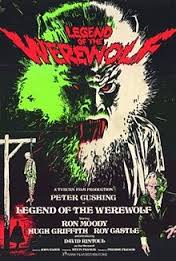
LEGEND OF THE WEREWOLF
UK, 1974, 90 Minutes, Colour.
Peter Cushing, Ron Moody, Hugh Griffith, Roy Castle.
Directed by Freddie Francis.
The Curse of the Werewolf and The Legend of the Werewolf are two versions of the Werewolf legend written by John Elder. There is fifteen years between the two treatments. Both are horror tradition films in the Hammer Studio style. One is set in Spain, the other in France. The first is notable for an early performance by Oliver Reed in the central role. The second is notable for character performances by Ron Moody and Hugh Griffith. Both are interesting, if somewhat pedestrian, versions of the legend.
1. Audience interest in such legends? The introduction and explanation of the legend? European origins? Mythology, symbolism of evil? The wolf as a symbolic destructive animal? The film's presenting detail of the legend? Plausibility?
2. The middle-European setting? The prologue and the wanderers and their deaths? The boy taken by the wolves? Plausible origin? The transition to Paris in the 19th century as a setting for such legend?
3. The appeal of horror to audiences? Violence, gory deaths. dangers and risks, the impersonation of evil?
4. Location and colour photography? Music? The importance of the subjective shots from the wolf and wolf-man's point of view and the use of the red filter?
5. The establishing of the carnival at the beginning. the types, the proprietor and his wife and their reaction? The tawdry performance and the country peoples' reaction? The discovery of the boy, exploiting his potential, using him in the act? Success? Their treatment of him?
6. Naming him Etoile? His growing up. his relationship with the carnival people, with Tiny? His eventual destruction of Tiny?
7. His experience of becoming a wolf. his destructive element, the unconsciousness? His leaving and his being pursued? The transition at the zoo. the way of life at the zoo? The personality of the zoo-keeper and his liking for Etoile, exploiting him?
8. The world and the environment about the zoo? The tawdriness of the zoo keeper? The brothel and the prostitutes having lunch in the zoo? Etoile and his not realising the world in which he found himself? The contrast with his handling of the animals?
9. The transition of the professor, his theories, laboratories, interest?
10. How did the screenplay begin to combine the world of Etoile and the professor? Two different worlds? United by mystery and science?
11. How well-drawn were the characters? The zoo-keeper, Etoile himself, the prostitutes, especially Christine? The professor and the police?
12. Audience sympathy for Etoile and his plight?
13. The changing of the moon. his becoming the wolf-man, the motivation of the deaths and the connection with Christine and the brothel? The puzzle in Paris?
14. The build-up from the point of view of the prostitutes, the Madame? The police and their investigations? The professor's visit to the brothel and his questioning people?
15. The world of the police? The professor and his work for the police? His supplying information and official disbelief? (political implications of those going to the brothel?)
16. The final pursuit, the sewers, the pathos of the wolf man and his suffering? The professor and his wanting to save him? The police and their killing him? Christine and her terror. her love, her realisation of the truth?
17. The purpose of presenting such legends on a screen? Symbols of evil?
Published in Movie Reviews
Published in
Movie Reviews
Tagged under
Saturday, 18 September 2021 19:29
Curse of the Werewolf
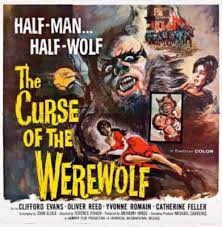
THE CURSE OF THE WEREWOLF
UK, 1961, 88 Minutes, Colour.
Oliver Reed, Clifford Evans, Hira Talfrey, Catherine Feller, Yvonne Roman, Anthony Dawson, Warren Mitchell.
Directed by Terence Fisher.
The Curse of the Werewolf and The Legend of the Werewolf are two versions of the Werewolf legend written by John Elder. There is fifteen years between the two treatments. Both are horror tradition films in the Hammer Studio style. One is set in Spain, the other in France. The first is notable for an early performance by Oliver Reed in the central role. The second is notable for character performances by Ron Moody and Hugh Griffith. Both are interesting, if somewhat pedestrian, versions of the legend.
1. What are the main characteristics of horror films? Were they evident in this production? How well were they used? why did audiences respond well to horror films? To the themes, to the myths, legends, horrifying incidents and situations? Matters of style? (How seriously did audiences take horror films?) How should they take them?
2. What is the intrinsic interest in the wolf-man myth? The savage animal within the man? The savage sub-conscious like a vampire? The wolf-man conscious of his inner drives and unable to control them? The need for love to control them? Society not allowing this? The only solution being conscious death? How well portrayed was this myth?
3. Was the structure of the film satisfactory?
4. The use of the commentary and background, the passing of time, the background for the birth of the wolf man, the focusing on the final incidents?
5. Comment on the style of the film: the use of locations, costume, Spanish background? The quality of the acting and dialogue?
6. Violence is intrinsic to horror films. How well was violence portrayed here: in the initial banquet-scene humiliation: the prison scenes, the murders, the wolf-man's behaviour, his death?
7. How significant was it that this story was set in Spain? The religious and superstitious background? The role of the priest in knowing the myth?
8. The attitude towards society of the film? The initial marriage, the comments of the people in the inn, the nobles at the banquet and their humiliation of the beggar, the use of the serving-maid, prison? The aristocracy? The kindly family who took Leon in? The employer with the wine? The police and the mayor? The clash between rich and poor?
9. How important for atmosphere was the initial arrival of the beggar and his treatment? How effective was this? The importance of the Joan sequences and the beggars growing wolfish? The rape of the girl and the birth of the child?
10. How did this contrast with the good family who looked after Leon and the girl? The Count and Theresa? The priest? The herdsman and his shooting of the wolves? The contrast between these people and the aristocracy?
11. How well did the film visually convey the wolfishness of the situation - the real wolf, the massacres, young Leon, the older Leon, the final look of the wolf-man?
12. How important was it to show the young Leon as a wolf-boy for the final climax? What this effectively done?
13. The dramatic significance of Leon as he grew older, not subject to fearful dreams, his knowledge of the truth, his working, falling in love, his killing of his friend, his not wanting to be a wolf-man and the torment for him? Were these well conveyed? His wishing his own death? Did he have any alternative? Was this dramatically well conveyed?
14. How important was this theme of self-awareness of the wolf-man? Did it make it different from mere sub-conscious urgings?
15. How effective was the final climax with the death of Leon?
Published in Movie Reviews
Published in
Movie Reviews
Tagged under
Saturday, 18 September 2021 19:29
Curse of the Pink Panther, The
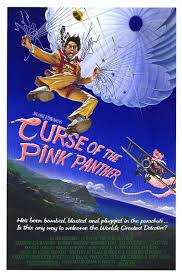
THE CURSE OF THE PINK PANTHER
US, 1983, 105 minutes, Colour.
David Niven, Ted Wass, Rich Little, Robert Wagner, Herbert Lom, Joanna Lumley, Capucine, Robert Loggia, Roger Moore, Burt Kwouk, Harvey Korman.
Directed by Blake Edwards.
The Curse of the Pink Panther was made by Blake Edwards back-to-back with The Trail of the Pink Panther in 1982. The latter capitalised on the memory of Peter Sellers and used outcuts not used in previous films. The film also highlighted his disappearance and the search for Inspector Clouseau. Critics were not particularly favourable to this posthumous tribute to Peter Sellers.
The Curse of the Pink Panther has a stand-in in the shadows for Peter Sellers in the prologue. He is present in memory by the Inspector Clouseau Museum (looked after by an ever-aggressive Cato, who is also trying to evade Professor Balls (Harvey Korman), trying to get paid for the disguises supplied for the Inspector). Bert Kwouk and Harvey Korman do their typical guest roles.
Inspector Dreyfus is to the fore in this comedy - again Herbert Lom with long-suffering accidents and a desire to finally see his psychiatrist. He bugs a computer which is to find the greatest detective who can find Inspector Clouseau. It comes up with Ted Wass - a lanky American comedian, who looks like a mixture of Harold Lloyd and Christopher Reeve as Clark Kent. He is an American version of Inspector Clouseau's disaster slapstick accidents. There are plenty of these, some of them laboured, some of them very funny - an umbrella at the airport, many attempts on his life by Robert Lodge's Mafia men. Wass is incompetent but somehow or other moves through the proceedings and succeeds, to all intents and purposes, in indicating that Clouseau is dead.
In the meantime we see Sir Charles Lytton (David Niven in his last film - his voice dubbed by Rich Little) with his wife Capucine and Robert Wagner reappearing as George. By an irony they finish up with the Pink Panther. Joanna Lumley plays a Countess who has abducted Clouseau - and changed his appearance by plastic surgery. In a surprise joke at the end of the film, Clouseau has been remodelled as Roger Moore. Moore good-naturedly imitates Clouseau's voice and all his accident-prone mannerisms.
The film is typical of Blake Edwards' enjoyment of slapstick comedy - but by this stage in the proceedings it seems a bit worn. However, there are quite a number of good laughs and guest roles - e.g. Graham Stark as a waiter. As with the original (for which some moralising critics condemned it) there are some obvious and broad, if very funny, sex jokes. At the time, it remained to be seen whether Ted Wass would emerge as Peter Sellers' successor in Blake Edwards' comedies.
(The Pink Panther himself appears, as always, to good effect in an animated credits sequence.)
Published in Movie Reviews
Published in
Movie Reviews
Tagged under
Saturday, 18 September 2021 19:29
Culpepper Cattle Co, The / Dust, Sweat and Gunpowder
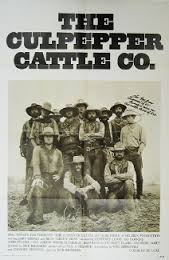
THE CULPEPPER CATTLE CO (DUST, SWEAT AND GUNPOWDER)
US, 1972, 92 minutes, Colour.
Gary Grimes, Billy "Green" Bush, Luke Askew, Bo Hopkins, Geoffrey Lewis.
Directed by Dick Richards.
The young hero of this film, played by Gary Grimes, wants to be a cowboy more than anything. By the end of the film he has gone on a cattle trek, been a cowboy and experienced the dust, sweat, gunpowder, isolation, ugliness and death of the west.
This is that kind of Western. As such, it should provide satisfying enough entertainment for the fans who are now used to anti-western westerns. However, the film tries to have the best of both worlds, showing us gunfights, confrontations and myriad tough cowboy poses for the expected audience response and then goes on to disillusion the hero about it all.
1. The original title of the film was 'The Culpepper Cattle Company'. Is the present title a better one? Why?
2. Was this a good Western? Why?
3. Comment on the nostalgia of the photos used during the credits and the music used during the film.
4. The film was made from the perspective of a boy. How well was this done? How was this illustrated in the initial sequence? The boy's ambitions?
5. The film also showed the cowboy perspective. How was this done? The conventions of the cowboy's life. the cowboy phrases and poses? The Culpepper cowboys? The gun-fighters?
6. The film was made from the perspective of the cattle trek. Was the reality of the trek well shown? Did the Culpepper Company make sense in this perspective?
7. How did the hero fit into the cattle trek? Why did he have to start as a kitchen boy? How did he make friends with people? How was a boy meant to learn how to be a cowboy?
8. How good an adventure was this: - the trek itself. the difficulties of the trek. cattle being stolen, robberies and violence, the possbillities of death?
9. How did the film show a boy proving himself in the West? How did he have to learn to grow up? Was this a worthwhile way of growing up?
10. What impression did the gun-fighters make, their violence, their rather stupid poses? Their belief in themselves? Their taking justice and law into their own hands? Were they in any way admirable?
11. How was the West ugly, especially in terms of dust, sweat and gunpowder?
12. How did the geographical changes of the trek correspond to the growing harshness of the West and the disillusionment with the West?
13. What did the film show about the large property owners and their owning of the towns and their cruelty?
14. What impression did the religious brethren make? Why were they there? How sane were they? what made them this way? Why did their plight appeal to the boy?
15. The impact of the shootout? Why did the men come to the boy's aid? Did they expect to die? Was there something fatalistic in their expectations that they would be shot? were you surprised at the reaction of the brethren when they left this place?
16. How disillusioning was this experience for the boy? Why? What future would he have had - a cowboy?
17. This film showed disillusion with the West. nevertheless it used all the conventions of posses and violence. Did it try to be both for and against Westerns at the same time? Was it successful?
Published in Movie Reviews
Published in
Movie Reviews
Tagged under
Saturday, 18 September 2021 19:29
Cujo
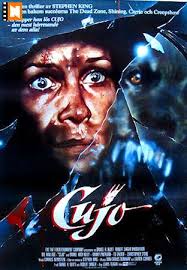
CUJO
US, 1983, 89 minutes, Colour.
Dee Wallace, Christopher Stone, Danny Pintauro, Ed Lauter, Daniel Hugh Kelly.
Directed by Lewis Teague.
Cujo is an excellent version of Stephen King's horror novel. Unlike many of King's other novels where the emphasis is on the 'supernatural', this film shows a St. Bernard dog infected with rabies and then turning against human beings. The main focus of the film is the menacing of a mother and her young son in their car in an isolated area.
Dee Wallace (The Howling, E.T.) is very good as the mother. There is an excellent performance by as her son Danny. The film is made more complex by the background plot where the mother is involved with an affair, breaks it off, and somehow the blame for her affair is linked with her being menaced by Cujo. The film was directed by Lewis Teague (The Lady in Red, Alligator).
1. The impact of the film as a thriller, as a moral fable?
2. The work of Stephen King, his themes: emotions fears, nature, the natural order, physical and moral order, danger, salvation and redemption? Reality and fantasy? The world of the family? The world of advertising?
3. The film as a piece of Americana: the details of town life, affluence, the world of the child, the world of adults, the outsiders?
4. Cujo and the audience response to the St Bernard? The lyrical prologue, the chasing of the rabbit, the American countryside, the burrow and the bat, the bite, the infection, the sore, the rabies and the disintegration of Cujo? Beginning to prowl? The relationship with the boy? The family leaving? The attacks, killing? The lurking around the house, the men ace, the growl? Driven berserk by the phone call? The irony of the caring phone calls driving Cujo mad? His presence on the farm, Donna and Danny in the car, his circling them, lurking, frightening them, the physical attacks on the car, the continued phone calls, his cunning, desperation? A symbol of fear? The mother getting outside the car and Cujo's attacking her? The policeman and his being mauled? Donna and the confrontation with Cujo, shooting him? His final rush at her? The audience's feelings for the infected dog? The dog as a symbol of evil, infection, menace?
5. Danny and his initial fears, his nightmares, the parents and their love for their boy, helping him? Words, images? Night and light, darkness? Daylight and reality? School, friend ships, fights? His relationship with his mother? Father? Home details? His father's leaving home? His mother's care? The tensions between husband and wife? His going in the car, his fears, the menace of the dog, his terrified reaction, being dehydrated, needing moisture, his sleeping? The experience of the menace? The being saved by his mother?
6. Donna and her role as mother, helping her son? Her love for her husband? The details of ordinary life? The discovery of the affair? The tensions? The fight and the break? Her husband's leaving and her desperation? Admitting the truth, hopes for the future? The first visit to the garage and seeing Cujo? The contrast with the return? Being trapped, using her wits, fear, care for her son, moisture, dehydration? Her attempts to leave the car and the attack? The policeman? Her finally leaving the car, the shooting of Cujo? Saving her son, the reconciliation with her husband? Her ordeal seen as a kind of atonement for the affair?
7. The father and his care for his son, his work, the ads and the indications of danger, campaign, the discovery of the affair, the clash with his wife, leaving home, love for them, the meals, his concern, the hotel, walking out on the deal, driving, the discovery of the wrecked house, the police, his visit to the garage? Reconciliation?
8. The local handyman and his having an affair with Donna, the clash, his coming to destroy the house - the brute image and the comparisons with the rabid Cujo?
9. The repairs man, his family, their squalid lifestyle, his brutality, his wife winning the lottery, their going on holidays, leaving Cujo, the phone calls, his alternate plans, his friend, Cujo's attack and their deaths?
10. The film's attention to detail: the cars, the postman, the phone calls, the police? The town yet the isolation?
11. The background of the world of commercials? Ads and their truth, deception? money and ad campaigns?
12. The film as a parable of the menace of evil, nature menacing, human beings at the whim of nature? The moral issues?
Published in Movie Reviews
Published in
Movie Reviews
Tagged under
Saturday, 18 September 2021 19:29
Cry for Me Billie
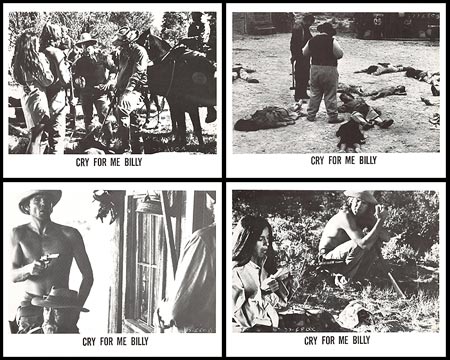
CRY FOR ME BILLIE
US, 1972, 92 Minutes, Colour.
Cliff Potts, Xochitl, Harry Dean Stanton.
Directed by William A. Graham.
The 'Billy Jack' genre - individualist hero, tough and tender, espousing U.S. causes of oppression by poverty or racism and presented almost as a legendary romantic hero - has been extremely popular in America and in Australia. This is definitely one of those films, quite well done. The setting and conventions are those of the west, the oppressed are the Indians, the oppressors the brutal Army. So much of the photography is beautiful with lyric episodes that the violence, rape and slaughter, is not only brutal but evokes angry revulsion and the film appears to be battling for a cause and attacking complacent America. A good film of its kind.
1. The tone of the title? Alternate titles were Naked Revenge, Face to the Wind. Indication of themes and emphases by the various titles?
2. Audience expectations of a Western? The conventions of gun-slingers, the Indians, the military? The clashes between White and Red? The terrain of the West? How did the film fulfil expectations, clash with them?
3. The chase structure of the film and its dramatics, audience involvement? The audience asked to take sides and identify? A vengeance chase structure and audiences asked to participate in themes of vengeance?
4. The importance of the colour photography, the landscapes, the beauty of the terrain and the ugly events which happened there? The contribution of the score, the songs? The ballad tone of the film?
5. The picture of the West: the outpost towns, the people, the military occupation, the Indians and their being rounded up and humiliated, the workmen of the town, the blacksmiths etc.? The brutality inherent in the outpost settlements? Cruelty, humiliation, sexual assault, rape? These as background and part of the motivation for the chase and pursuit? The film's presentation of these as part of the 19th century American heritage?
6. How sympathetic a character was Billie? His place in the West as a gunfighter, his career, quickness, friendship with Luke? Luke's quiet way of life and the invitation to Billie? The possibility of his retiring and settling down? His reaction to the humiliation of the Indians and his rising to their defence? The military's hostility towards him? The ingredients for conflict and confrontation? How sympathetic were his attitudes towards the Indians? The scene with the water, his warnings about the Indians?
7. The presentation of the Indians as people, their treatment, the water sequence, the humiliation, their being shot, the rape of the Indian girl? The film's presentation of officialdom and its brutality towards a subjected people?
8. The confrontation of the girl: her riding, naked, her fear? Her fear of Billie and the response to his helping her? Riding together? The language barrier and yet their communicating? Affection? The bond and Billie as saviour?
9. The picture of the soldiers and their searching, the catching of Billie and the girl, the ugliness of the group rape and the need for justice? Billie and his being tortured?
10. Billie challenged by the ugliness of the West? His saving of the girl and the bonds between them, the lyrical tone of these sequences? The brutality of the rape in contrast? Billie and vengeance, his wreaking justice on the soldiers? The comparison with his treatment of the blind man and his payment for food? The significance of this contrast?
11. Audience sympathy for the Indian girl, her escape, her suicide? The emotional impact on Billie, the burial?
12. The classic set-up for a confrontation? Billie and his achievement? The death of the gun-fighter? Luke and his lament? The cinema treatment of themes of the West and violence - interest for the 20th century audience, adventure, the American heritage, the human themes?
Published in Movie Reviews
Published in
Movie Reviews
Tagged under